Structural engineering laboratory
The Structural Engineering Laboratory at Vel Tech serves a wide spectrum of activities namely teaching, research, development, and consultancy. The primary activities include experimental studies on model/prototype of structural elements and assemblies under various static and dynamic loading conditions.
Facilities at Structural Engineering Lab
- Double box type of structural testing floor of size 6m x 6mhas been designed to carry reversal of loads (200T in tension/compression) in both directions with data acquisition system.
- Structural designs for different types of Structures.
- Structural designs for bridges
- Non-Destructive testing on concrete structures.
- Rehabilitation of different types of structures.
- Live load testing on different types of buildings.
- Live load testing of bridges (before and after rehabilitation).
Structural Strong Floor and Reaction Frames
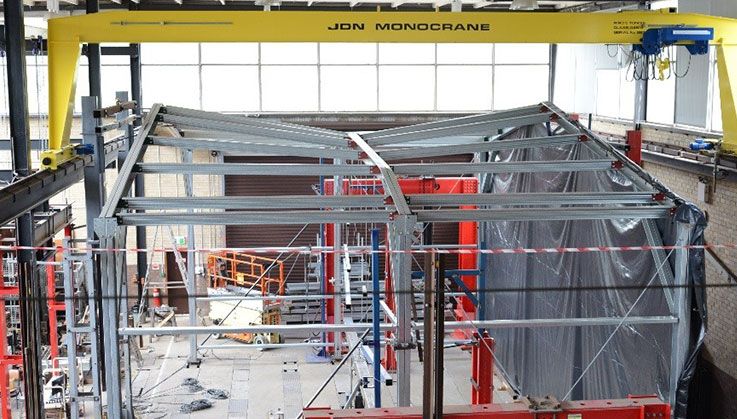
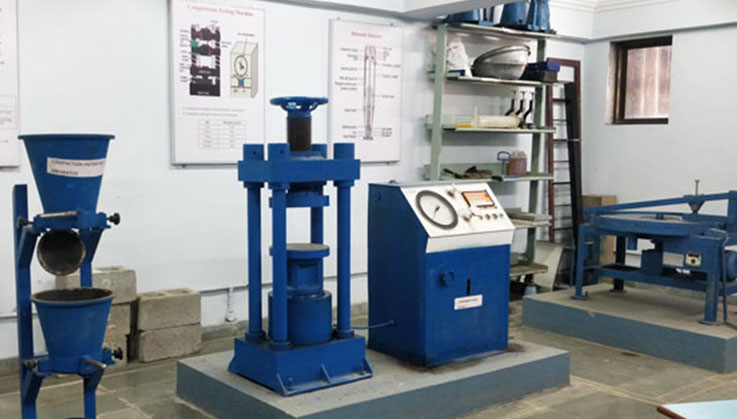
Concrete technology laboratory
Students learn the standard procedure to test the quality of building materials in line with the corresponding IS codes. The lab has equipment for conducting tests on concrete to verify its quality. In addition to meeting the curriculum and consultancy requirements, the equipment in the laboratory are extensively used for research projects by the students of UG, PG and also by faculty for their research works.
Facilities at Concrete Technology Lab
- Determination of Properties of Aggregate
a) Crushing Strength
b) Impact Strength
c) Elongation and Flakiness index
d) Water Absorption
e) Abrasion Test
f) Specific Gravity
g) Sieve Analysis - Determination of Properties of fresh concrete a ) Slump Cone Test
- Determination of Properties of Hardened Concrete a) Compression Test
Concrete laboratory provides facilities to conduct Basic properties tests on concrete constituents and also all quality control tests on cement, aggregates and concrete (Fresh and hardened state).
b) Vee Bee Consistometer
c) Flow Table Test
d) Compaction Factor
b) Split Tensile Test
Geotechnical engineering laboratory
The Geotechnical Engineering laboratory is equipped to perform all the necessary tests for the basic characterization of soils, along with several advanced testing facilities. It helps in identifying the engineering behaviour of soils by determining the different physical, chemical and geotechnical properties. The tests that can be performed in the laboratory are determination of index properties, shear strength parameters using Direct Shear, UCC and triaxial tests, permeability and consolidation characteristics and CBR value
Facilities at Geotechnical Engineering Lab
- Sub-surface investigation using SPT, SCPT & bore well groundwater diviner and furnishing report with recommendations.
- Estimation of earth works for construction of structures and roadway.
- Determining the safe bearing capacity of foundation systems and suggesting remedial measures for foundations subjected to settlement and foundation failure.
- Determining the weak soil conditions and recommending ground improvement techniques.
- Loading frame of 200kN Capacity
- Fully digitalised Triaxial testing facility to test samples of diameter 38mm, 100mm and 150mm.
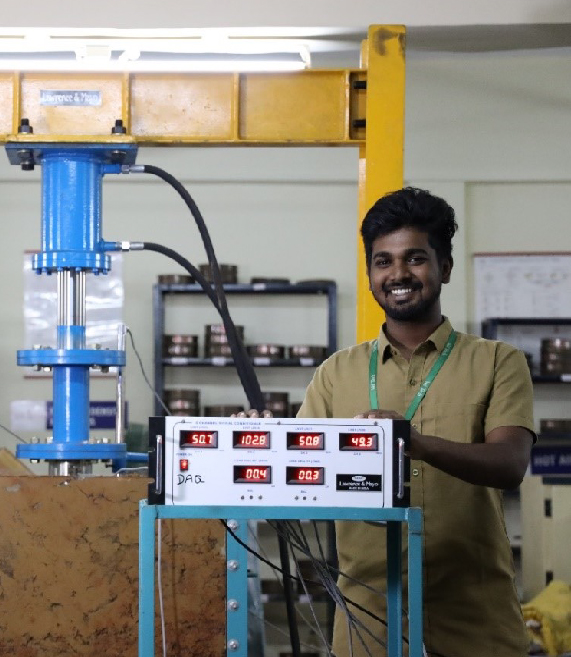
Environmental engineering laboratory
The Environmental Engineering laboratory practical provides good insight into different experimental methods relevant to Environmental Engineering. The Environmental Engineering Laboratory in the Department of Civil Engineering provides good testing, teaching and research facilities. The laboratory contain modern analytical instruments and facilities to carry out simple to sophisticated experiments i.e. the testing of Physico-chemical and Biological parameters for Water and Wastewater, Air pollutants testing in stack and environment etc.
Facilities at Environmental Engineering Lab
Physical Examinations:
Colour, odour, turbidity, electrical conductivity, total dissolved solids, suspended solids.Chemical Examinations:
pH, alkalinity, hardness, sodium, potassium, iron, manganese, ammonia, nitrite, nitrate, chloride, fluoride, sulphate, phosphate, Bio-Chemical oxygen demand (BOD), Chemical oxygen demand (COD), Total Kjeldahl nitrogen (TKN), oil and grease, aluminium, chromium, arsenic, and residual chlorine.Bacteriological Examination:
Standard plate count, total coliform, fecal coliform, fecal streptococci.Water for Construction purpose:
Fitness.Bleaching powder and Alum:
Quality analysis.
Testing Facilities in Environmental Division Laboratories
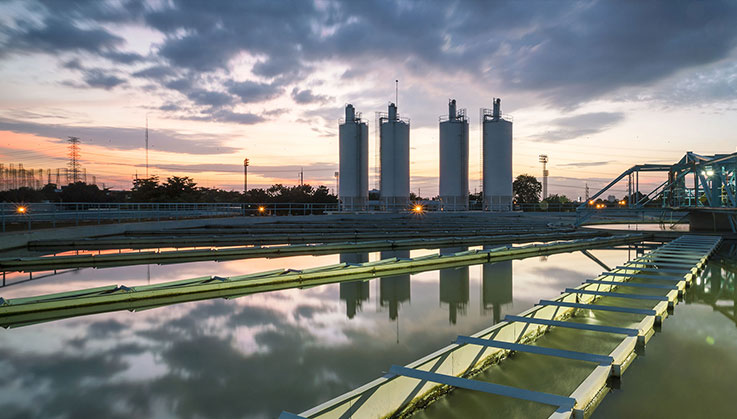

Engineering geology laboratory
The Engineering Geology laboratory has a foot print by providing a hands on experience in line with Physical geology, idetification and interpretation of rocks and minerals, analysis of the topo maps and satellite images.
Our Geology division is managed by hydro-geologist one who is specialized in geology and hydrogeology and having a decades of experience in groundwater services for farms, industries, residential apartments, house use, offers an efficiently and competitively services in groundwater potential scientific assessment test for borewell, open well locations.
Facilities at Engineering Geology Lab
- Drilling monitoring by experienced Geologists.
- The best scientific approach bore well drilling related service.
- To find the groundwater potential point for bore well.
- Open well location, bore well drilling and cleaning work.
- Ground water recharge and rain water harvesting service.
Computer aided design and drafting laboratory
The computer aided design and drafting laboratory provides an area to design, develop, modify, analyze and optimize a structure. The laboratory receives hardware updates once in every year so that the students are synced with the latest knowledge sharing platform. Also the computers in the lab contain a number of engineering licensed software essential to complete the design and drafting knowledge in engineering courses including Auto CADD, Staad.Pro, Primavera, MS Project and various other open source software related to various disciplines of Civil Engineering.
Facilities at Computer Aided Design And Drafting Lab
- Drafting and detailing the reinforced concrete structural elements.
- Analyzing and Designing of various structures including concrete and steel as per various codal provisions.
- Estimation for construction of any building in the view of planning the task, resource management and workloads.
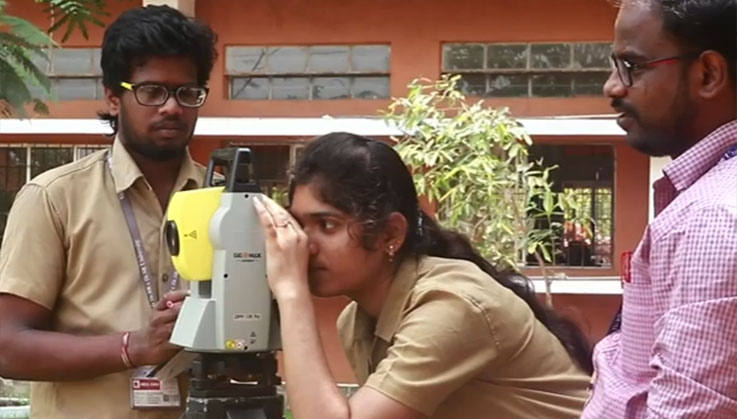
Surveying Laboratory
Surveying laboratory has the infrastructure ranging from basics to advanced tools & instruments for the execution of measurements in all types of terrains
Facilities at Surveying Lab
- Route alignment survey for road, pipeline, canal, transmission line, etc.
- Contouring and extimation of reservoir capacity.
- Markings for construction works.

Highway Engineering Laboratory
The objective of Highway Engineering laboratory is to determine some of the properties of coarse aggregates and bitumen. Experiments include tests for impact, abrasion and crushing strength for coarse aggregates. For bitumen, tests include penetration, ductility, viscosity, softening point and flash and fire point. The students will be able to infer the suitability of these materials for construction of road. This laboratory course will help the students to understand the theoretical concepts learned in the course transportation engineering at the end of the course students will be able to test all the concrete materials as per IS code, design of the concrete mix using IS code, determine the properties of fresh and hardened concrete, measure the physical properties of the bitumen.
Facilities at Highway Engineering Lab
- To measure the ductility of a given sample of bitumen.
- Determine the suitability of bitumen for its use in road construction.
- To determine the flash and fire point of a given bituminous materials.
- Determine the consistency of bituminous materials.
- Determine the flakiness index of given aggregate sample.
- To find out the aggregate impact value of aggregate.
- To determine the softening point of bitumen.
